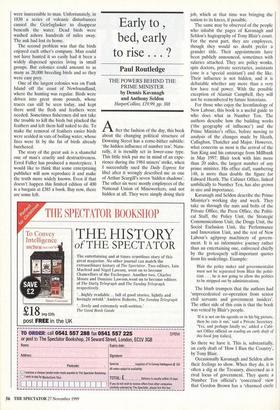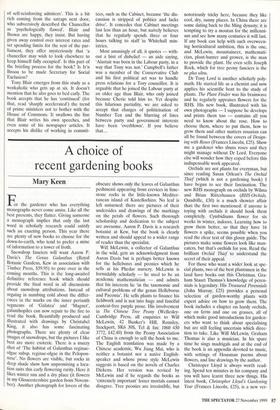Early to, bed, early to rise . . . ?
Paul Routledge THE POWERS BEHIND THE PRIME MINISTER by Dennis Kavanagh and Anthony Seldon
HouperCains, £19.99, pp. 388
After the fashion of the day, this book about the changing political structure of Downing Street has a come-hither subtitle: the hidden influence of number ten'. Natu- rally, it is trendily set in lower-case type. This little trick put me in mind of an expe- rience during the 1984 miners' strike, when I successfully sued the Daily Express for libel after it wrongly described me as one of Arthur Scargill's seven 'hidden shadows'. The other six were mostly employees of the National Union of Mineworkers, and not hidden at all. They were simply doing their
job, which at that time was bringing the nation to its knees, if possible.
The same may be observed of the people who inhabit the pages of Kavanagh and Seldon's hagiography of Tony Blair's court. For the most part, they are employees, though they would no doubt prefer a grander title. Their appointments have been publicly announced, sometimes with salaries attached. They are policy wonks, spin doctors, private secretaries, assistants (one is a 'special assistant') and the like. Their influence is not hidden, and it is debatable whether any more than a very few have real power. With the possible exception of Alastair Campbell, they will not be remembered by future historians.
For those who enjoy the lcremlinology of New Labour, this book is a useful guide to who does what in Number Ten. The authors describe how the building works ('the geography of influence') and the Prime Minister's office, before moving to analysis of the changes made by Heath, Callaghan, Thatcher and Major. However, what concerns us most is the arrival of the Sun King and his entourage from Millbank in May 1997. Blair took with him more than 20 aides, the largest number of any prime minister. His office staff, numbering 148, is more than double the figure for Edward Heath. The Cabinet Office, linked umbilically to Number Ten, has also grown in size and importance.
Kavanagh and Seldon describe the Prime Minister's working day and week. They take us through the nuts and bolts of the Private Office, the Press Office, the Politi- cal Staff, the Policy Unit, the Strategic Communications Unit, the Drugs Unit, the Social Exclusion Unit, the Performance and Innovation Unit, and the rest of New Labour's agitprop machinery of govern- ment. It is an informative journey rather than an entertaining one, enlivened chiefly by the grotesquely self-important quotes from his underlings. Example:
Blair the policy maker and governmentalist must not be separated from Blair the politi- cian . .. he is not going to allow the politics lobe stripped out by administrations.
The blurb trumpets that the authors had 'unprecedented co-operation from senior civil servants and government insiders'. The other side of this coin is that the book was vetted by Blair's people.
'If it is not on his agenda or in his big picture, then he cuts it out,' said a Private Secretary. 'Yes, and perhaps fatally so,' added a Cabi- net Office official on reading an early draft of • this book [my italics).
So there we have it. This is, substantially, an early draft of 'How I Run the Country', by Tony Blair.
Occasionally Kavanagh and Seldon allow their feelings to show. When they do, it is often a dig at the Treasury, discerned as a rival locus of government. They quote a Number Ten official's 'concerned' view that Gordon Brown has a 'charmed circle of self-reinforcing admirers'. This is a bit rich coming from the satraps next door, who subversively described the Chancellor as 'psychologically flawed'. Blair and Brown are happy, they insist. But having given away control over interest rates and set spending limits for the rest of the par- liament, they offer mysteriously that 'a chancellor may wish to look elsewhere to keep himself fully occupied'. Is this part of the briefing process for the book? Is Ir'n Broon to be made Secretary for Social Exclusion?
Tony Blair emerges from this study as a workaholic who gets up at six. It doesn't mention that he also goes to bed early. The book accepts that he has 'continued' (for that, read 'sharply accelerated') the trend of prime ministers not to bother with the House of Commons. It swallows the line that Blair writes his own speeches, and even some of his newspaper articles. It accepts his dislike of working in commit- tees, such as the Cabinet, because 'the dis- cussion is stripped of politics and lacks drive'. It concedes that Cabinet meetings last less than an hour, but naively believes that he regularly spends three or four hours talking to staff in Whitehall min- istries.
Most amusingly of all, it quotes — with- out a hint of disbelief — an aide saying, 'Alastair was born in the Labour party, in a way that Tony was not.' Campbell's father was a member of the Conservative Club and his first political act was to handle press relations for a Tory councillor. It is arguable that he joined the Labour party at an older age than Blair, who only joined because Cherie told him to. Yet despite this hilarious partiality, we are asked to accept that charges of politicisation of Number Ten and the blurring of lines between party and government interests have been 'overblown'. If you believe that...



























































































 Previous page
Previous page